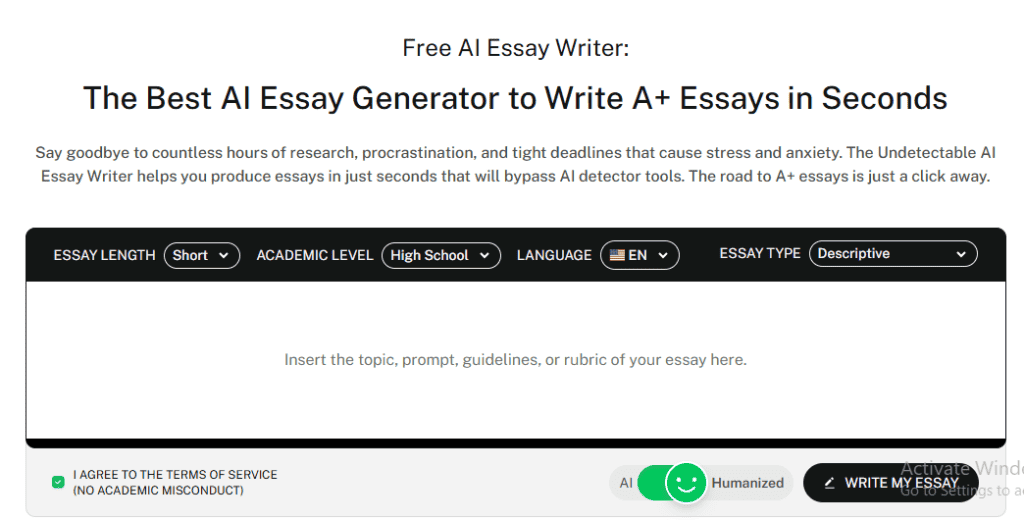Essays are one of the pillars of academic writing.
As you progress in your academic career, both the complexity of the topics and the length of the essays tend to increase.
Since grade school, our teachers have been training us to write essays on topics ranging from planets to more complex ones, like political views and opinions.
When we first started writing, it felt like 500 words was too long.
But as first-time writers, many of us were more focused on the word count and making our essays longer than the actual content.
At one point or another, we were guilty of stuffing our essays with words we barely understood because they sounded “academic.”
If you’ve been struggling with essay length and incorporating suitable words, don’t fret. There are also experienced essay writers who can help you refine your work and make it more impactful.
In this guide, we’ll break down exactly how long different types of essays should be, what words strengthen your arguments, and which vocabulary choices make professors cringe.
Whether you’re writing a high school assignment or your college application essay, these practical tips will help you write with confidence.
How Long Should an Essay Be?
“How many words should my essay be?” ranks among the most common questions students ask.
The answer isn’t one-size-fits-all, but understanding the expectations for different essay types can save you from unnecessary stress.
The perfect essay length depends on several factors:


Never Worry About AI Detecting Your Texts Again. Undetectable AI Can Help You:
- Make your AI assisted writing appear human-like.
- Bypass all major AI detection tools with just one click.
- Use AI safely and confidently in school and work.
- Your academic level (high school, undergraduate, graduate)
- The assignment type (argumentative, research, personal statement)
- Your instructor’s specific requirements
- The complexity of your topic
Most instructors provide word count expectations in their assignment guidelines.
These aren’t arbitrary numbers but rather reflect how much depth and detail the assignment requires.
A 500-word essay tests your ability to be concise, while a 3,000-word paper allows room for comprehensive analysis.
When no word count is specified, the safe approach is to follow standard conventions for your essay type and academic level.
We’ll cover those shortly, but first, let’s go over why word count matters in the first place.
Why Word Count Matters in Academic and Professional Writing
Word counts aren’t just arbitrary limitations—they serve important purposes in academic and professional contexts.
First, they create standardized expectations.
When an instructor assigns a 1500-word essay, they’ve calibrated the assignment to test specific skills and knowledge.
Writing significantly under the word count suggests you haven’t fully developed your ideas.
Going dramatically over may indicate you’ve strayed from the assignment’s focus.
Word counts also teach the important skill of writing against a brief, something vital in professional settings where conciseness is valued.
Learning to express complex ideas within defined parameters prepares you for everything from business proposals to technical documentation.
Need to check your word count? Tools like Undetectable AI’s Free Word Counter make this simple.

Just paste your text into the counter, and it instantly displays your word count, character count, and reading time.

This helps you gauge whether you need to expand your ideas or trim unnecessary content.
General Guidelines for Different Essay Types
Before going into specific word counts, let’s understand the general expectations for various essay types:
- Short essays: Typically 250-500 words, these brief compositions test your ability to make a point concisely. Common for in-class assignments or quick response papers.
- Standard essays: Usually 500-1000 words, these form the backbone of high school and early college writing assignments. They include an introduction, 2-3 body paragraphs, and a conclusion.
- Extended essays: At 1000-3000 words, these allow deeper exploration of a topic. Common for undergraduate papers requiring more research and analysis.
- Term papers/Research essays: Ranging from 3000-5000 words, these comprehensive papers involve significant research and typically account for a substantial portion of your grade.
- Thesis/Dissertation chapters: Graduate-level writing often requires 5000+ words per chapter, with complete dissertations reaching 40,000-80,000 words.
Essay Length Guide: Word Count Recommendations by Type

Now, let’s get specific. Here’s a breakdown of recommended word counts by essay type and academic level:
1. High School Essays
High school writing builds foundational skills that prepare you for college-level work.
At this level, essays typically follow these guidelines:
- Short response essays: 250-500 words (1-2 pages)
- Standard five-paragraph essays: 500-800 words (2-3 pages)
- Research papers: 800-1500 words (3-5 pages)
- Extended assignments/term papers: 1500-2500 words (5-8 pages)
Teachers at this level focus on helping you master basic essay structure and develop your ideas with sufficient evidence.
A 500-word essay might seem short, but it’s enough to present a clear thesis supported by several examples, perfect for learning fundamental composition skills.
Special guidelines apply to high school seniors writing college application essays (more on these in the personal statements section).
2. College Essays
College writing demands more sophistication in both thinking and expression:
- Short assignments (response papers, reflections): 500-750 words (2-3 pages)
- Standard undergraduate essays: 1000-1500 words (3-5 pages)
- Short research papers: 1500-2500 words (5-8 pages)
- Term papers: 2500-3500 words (8-12 pages)
- Senior thesis projects: 4000-8000 words (12-25 pages)
The jump from high school to college writing is about depth of analysis.
A first-year college composition paper at 1000 words should demonstrate more critical thinking than a high school essay of the same length.
As you progress through college, expectations shift.
Third and fourth-year courses often require more comprehensive research and sophisticated synthesis of sources, reflected in longer word count requirements.
3. Research Papers & Academic Essays
Research papers follow their own conventions regarding length:
- Short research papers (undergraduate): 2000-3000 words (6-10 pages)
- Standard research papers (undergraduate): 3000-5000 words (10-16 pages)
- Graduate-level research papers: 5000-8000 words (16-26 pages)
- Journal article submissions: Typically 6000-8000 words (guidelines vary by publication)
- Literature reviews: 3000-6000 words as standalone papers; 800-1500 words when incorporated into larger works
Research papers require space for literature review, methodology explanation, results presentation, and discussion of implications.
Writing a thorough research paper in fewer than 2000 words is challenging unless the scope is exceptionally narrow. If you need extra help in reaching the required word count or refining your content, there are plenty of options, such as a website to write essays, which can assist in ensuring your work is polished and meets academic expectations.
Academic disciplines also have their own expectations.
Humanities papers often run longer than those in the sciences, where concise reporting of experimental results is valued.
4. Argumentative & Persuasive Essays
Effective argumentation requires space to develop claims, address counterarguments, and provide evidence:
- Short argumentative essays: 1000-1200 words (3-4 pages)
- Standard argumentative essays: 1500-2000 words (5-7 pages)
- Extended argumentative essays: 2500-3500 words (8-12 pages)
- Debate briefs/position papers: 2000-4000 words (6-13 pages)
A strong argument needs room to breathe.
While you can certainly state a position in a few words, defending it thoroughly requires exploration of multiple angles.
The most persuasive essays don’t just state claims—they anticipate objections, address complexities, and build a scaffolded case that leads readers to agreement.
For truly complex issues, shorter word counts can actually hinder persuasiveness by forcing oversimplification of nuanced topics.
5. Personal Statements & Application Essays
Application essays follow strict guidelines because admissions committees review thousands of submissions:
- Common Application essays: 650 words maximum
- Coalition Application essays: 500-650 words
- Supplemental college essays: Typically 100-400 words
- Graduate school personal statements: 500-1000 words (varies widely by program)
- Scholarship essays: 400-1000 words (varies by scholarship)
These tightly constrained formats test your ability to communicate effectively within strict limits.
Every word must earn its place.
While underwriting is definitely a problem, overwriting can be equally damaging.
Admissions officers notice when applicants ignore word limits, and it reflects poorly on attention to detail.
Successful application essays and personal statements don’t try to tell your entire life story. Instead, they highlight one or two significant experiences that reveal your character, values, or goals.
Best Words to Use in an Essay (With Examples)

Beyond word count, the quality of your vocabulary significantly impacts how readers perceive your writing.
Here’s how to choose words that strengthen rather than weaken your essays:
1. Strong Words for Argumentative Essays
Argumentative essays benefit from precise, impactful vocabulary that clearly establishes your position:
- Claim-signaling words: demonstrates, establishes, validates, confirms, substantiates
- Evidence-introducing words: reveals, highlights, underscores, illustrates, exhibits
- Conviction words (use sparingly): crucial, essential, vital, imperative, fundamental
Example: Weak: This study shows that climate change is bad for agriculture. Strong: This longitudinal study establishes that climate destabilization fundamentally undermines agricultural sustainability.
The best argumentative writing uses strong verbs rather than relying on adjectives or adverbs.
Compare “significantly impacts” (stronger) to “has a really big effect on” (weaker).
2. Transition Words for Better Flow
Transition words create the logical bridges that guide readers through your argument:
- Sequence transitions: first, subsequently, finally, meanwhile, concurrently
- Addition transitions: furthermore, additionally, moreover, also, similarly
- Contrast transitions: however, nevertheless, conversely, although despite
- Causal transitions: therefore, consequently, as a result, thus, accordingly
- Exemplification transitions: for instance, specifically, namely, to illustrate
Example:
Choppy: Social media affects mental health. Many studies show depression increases. We should limit usage.
Flowing: Social media significantly affects mental health. Moreover, numerous studies demonstrate that depression increases with excessive use. Therefore, limiting usage should be considered a public health priority.
Effective transitions don’t just connect sentences—they reveal the relationship between ideas, helping readers understand your reasoning.
3. Persuasive Words to Strengthen Your Argument
Persuasive writing requires vocabulary that subtly guides readers toward your conclusion:
- Evidence-emphasizing words: clearly, evidently, undoubtedly, unquestionably
- Reader-inclusive words: we, our society, our community, our future
- Consequence-highlighting words: implications, repercussions, outcomes, impacts
- Urgency words: pressing, critical, urgent, immediate, looming
Example: Less persuasive: People should recycle more. More persuasive: Our community clearly needs to prioritize recycling, as the immediate repercussions of inaction will undoubtedly affect our environmental future.
The most persuasive writing doesn’t announce itself as persuasive. Instead, it presents arguments so logically that the reader arrives at your conclusion almost independently.
4. Academic Words for a Formal Tone
Academic writing requires discipline-appropriate vocabulary that signals your familiarity with scholarly conventions:
- Analysis words: examine, analyze, evaluate, assess, investigate
- Methodology words: implement, conduct, employ, utilize, apply
- Precision qualifiers: specifically, particularly, notably, significantly
- Scholarly verbs: posits, contends, asserts, maintains, hypothesizes
Example:
Casual: Smith looked at how poverty affects kids and found it really hurts their development.
Academic: Smith examined the impact of socioeconomic disadvantage on childhood development and identified significant detrimental outcomes across multiple domains.
The best academic writing isn’t about using the biggest words but about using precise terms that communicate complex ideas efficiently.
5. Words to Avoid in Academic Writing
Some vocabulary choices actively undermine your credibility in academic contexts:
- Absolute terms: always, never, every, all, none (rarely accurate in academic research)
- Emotional intensifiers: very, really, extremely, incredibly, terribly
- Colloquialisms: stuff, things, a lot, kind of, sort of, basically
- Hedge words when certainty is needed: maybe, perhaps, possibly, might
- First-person in formal research (field-dependent): I believe, I think, in my opinion
Example:
Problematic: This study proves that the program totally eliminated bullying in all schools.
Improved: This study suggests that the intervention substantially reduced reported incidents of bullying across participating schools.
Academic writing demands precision and measured claims.
Overstating your case paradoxically makes your argument weaker, not stronger.
How AI Can Help You Optimize Essay Word Count & Vocabulary
Many AI tools have transformed how writers approach essay composition, particularly regarding word count management and vocabulary enhancement.
Our AI Essay Writer helps struggling students generate well-structured first drafts that meet word count requirements.

Instead of staring at a blank page, wondering how to reach 2000 words, you can use AI to generate a substantive starting point, then refine and personalize the content.
Then, why not combine it with Undetectable AI’s AI Humanizer? It will suggest vocabulary improvements, identify overused phrases, and recommend more sophisticated alternatives.
It helps transform basic writing into more nuanced, engaging prose without venturing into the territory of pretentious language.
These tools work best when used thoughtfully—not as replacements for your own thinking but as collaborative assistants that help you express your ideas more effectively.
AI writing assistants can also help identify areas where you’ve under-explained concepts (helping reach minimum word counts) or where you’ve become unnecessarily wordy (helping trim bloated essays).
FAQs About Essay Word Count & Vocabulary
How Many Words Should a College Essay Be?
Standard college essays typically run between 1000-1500 words (approximately 3-5 double-spaced pages).
However, this varies by course level, assignment type, and institution.
First-year composition assignments might require only 750-1000 words, while upper-division courses often expect 2000+ words to accommodate more complex analysis.
Always consult your specific assignment guidelines, as instructors may have particular expectations based on their course objectives.
How Many Words Should an Essay Be?
The general guideline for essay length follows this pattern:
- High school essays: 300-1000 words
- Undergraduate essays: 1000-3000 words
- Graduate essays: 2500-6000 words
These ranges represent typical expectations, but specific assignments may fall outside these parameters.
When no word count is specified, aim for the middle of the range appropriate for your academic level.
Remember that quality trumps quantity.
A well-crafted 800-word essay will typically earn a higher grade than a rambling 1500-word submission that lacks focus or analysis.
What Are the Best Words to Use in an Essay?
The best words for essays are precise, appropriate to your discipline, and clear to your audience. Strong essays use:
- Specific nouns instead of general ones (e.g., “legislation” instead of “rules”)
- Active verbs that convey precise actions (e.g., “analyzes” instead of “looks at”)
- Transitional phrases that clarify relationships between ideas
- Discipline-specific terminology used accurately
- Varied vocabulary that avoids repetition without sounding thesaurus-dependent
The goal isn’t to use “impressive” words but to use exact words—terms that communicate your ideas with precision and clarity.
Go For Quality and Quantity
Mastering essay word count and vocabulary is all about developing the communication skills that will serve you throughout your academic and professional life.
The perfect essay length allows enough space to develop your ideas thoroughly without drowning your main points in excessive verbiage.
It demonstrates respect for your reader’s time and attention while fulfilling the assignment’s purpose.
Similarly, strong vocabulary choices show respect for your subject matter.
They signal that you’ve thought carefully about how to communicate complex ideas precisely and effectively.
Tools like our Word Counter help maintain the right balance, ensuring precision without unnecessary filler.
As you write your next essay, remember that word counts and vocabulary guidelines aren’t arbitrary hurdles.
With practice, you’ll develop an intuitive sense of how long different arguments need to be and which words best express your ideas.
Your goal isn’t just to hit a word count—it’s to say exactly what needs to be said in exactly the right number of words.
